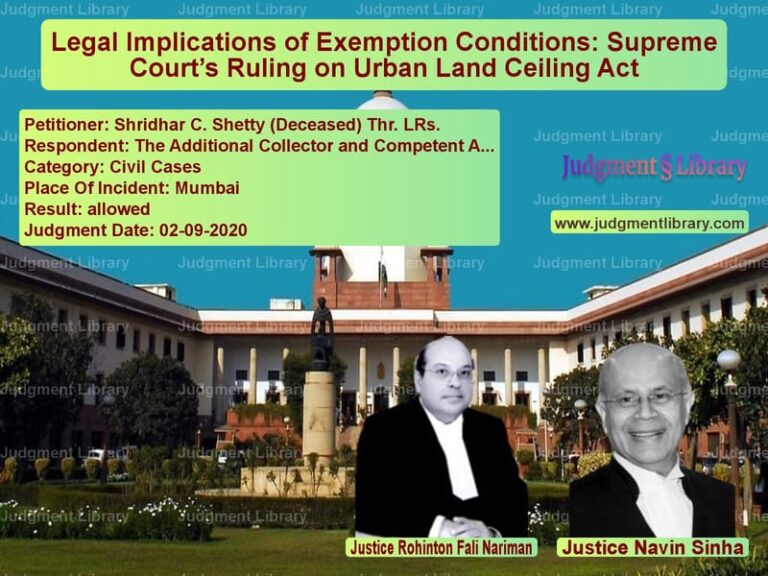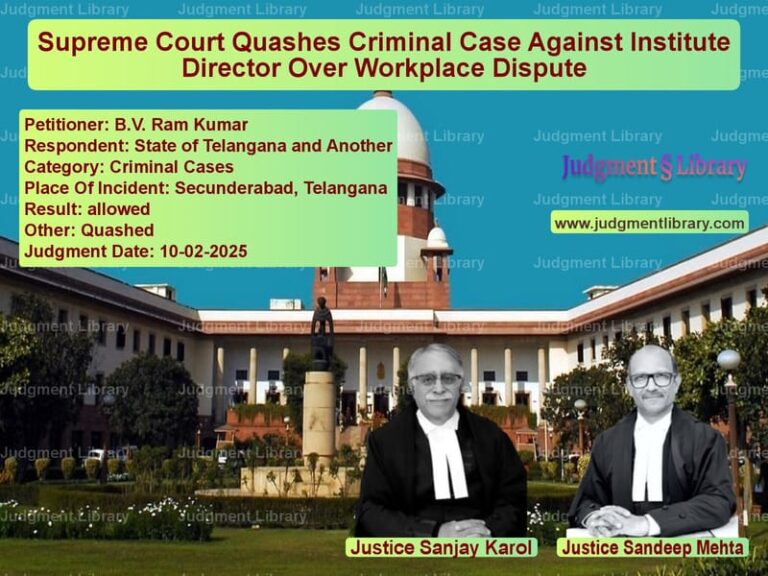Electricity Duty on Mining and Processing: Supreme Court’s Landmark Judgment
The Supreme Court of India, in a significant ruling, addressed the scope of electricity duty levied on mining and processing activities under the Madhya Pradesh Electricity Duty Act, 1949. The case of Manganese Ore India Ltd. vs. State of Madhya Pradesh & Others revolved around whether processing activities, which result in distinct commercial products, should be taxed at the same rate as mining.
The appellants, Manganese Ore India Ltd. and Hindustan Copper Ltd., contended that their operations went beyond mining and included manufacturing distinct products such as ferro manganese and copper concentrate. They argued that these activities should not attract the higher electricity duty applicable to mining.
Background of the Case
The case was initiated when the appellants challenged separate orders imposing electricity duty at a higher rate. The key dispute centered around the interpretation of the terms ‘mineral’ and ‘processing’ as per the definition of ‘mine’ under the Act. The appellants sought relief from what they claimed was an unjust extension of the mining duty to their processing activities.
Legal Framework and Key Provisions
The Madhya Pradesh Electricity Duty Act, 1949, provides for the levy of duty on the consumption or sale of electrical energy. Section 3(1) outlines the rates at which electricity duty is to be paid. Under Part B of the Act, different rates are prescribed based on the purpose of electricity usage.
Relevant to this case is the definition of ‘mine’ under Explanation (b) of Section 3(1), which states:
“Mine” means a mine to which the Mines Act, 1952 applies and includes the premises or machinery situated in or adjacent to a mine and used for crushing, processing, treating, or transporting the mineral.”
Petitioner’s Arguments
The appellants raised several key contentions:
- Definition of Mine is Being Overextended: The definition under the Act was being interpreted too broadly to include manufacturing activities that go beyond processing raw minerals.
- Manufacturing is Different from Processing: The appellants emphasized that while crushing or treating minerals could be considered part of mining, their operations involved metallurgical processes that transformed raw materials into new products.
- Unfair Taxation: They argued that treating their plants as part of a ‘mine’ led to arbitrary taxation, as other manufacturers of similar products not located near mines were taxed at a lower rate.
- Impact on Industrial Growth: The higher duty discouraged industries from setting up integrated manufacturing units near mining locations, affecting economic growth.
Respondent’s Arguments
The State of Madhya Pradesh defended the imposition of electricity duty, arguing:
- Legislative Intent: The Act was designed to levy higher taxes on industries that exploit natural resources, ensuring they contributed more to the state revenue.
- Definition of ‘Mine’ Includes Processing: Since the Act explicitly includes processing under the term ‘mine,’ units involved in any mineral-related processing should be taxed at the higher rate.
- State’s Authority to Classify: The state government had the authority to create tax classifications based on industry type and location, and this distinction was neither arbitrary nor discriminatory.
Supreme Court’s Observations
The Court examined whether activities conducted by the appellants fell within the extended definition of ‘mine’ under the Act. The key observations were:
- The principle of noscitur a sociis (interpreting words based on their association) applied to the definition of ‘mine.’
- Processing must be understood in relation to activities like crushing and treating minerals, rather than as full-scale manufacturing.
- Ferro Manganese and Copper Concentrate were distinct from raw minerals and underwent significant transformation.
- Imposing the higher mining duty on such processing units led to an unreasonable classification.
Final Judgment
The Supreme Court ruled in favor of the appellants, holding that:
- Units involved in metallurgical processes that result in distinct commercial products should not be classified as mines.
- The higher electricity duty should not apply to these units.
- Any excess duty paid should be adjusted against future demands.
The appeals were thus allowed, with no order as to costs.
Don’t miss out on the full details! Download the complete judgment in PDF format below and gain valuable insights instantly!
Download Judgment: Manganese Ore India vs State of M.P. & Ors. Supreme Court of India Judgment Dated 10-11-2016.pdf
Direct Downlaod Judgment: Direct downlaod this Judgment
See all petitions in Income Tax Disputes
See all petitions in GST Law
See all petitions in Tax Refund Disputes
See all petitions in Judgment by Dipak Misra
See all petitions in Judgment by Shiva Kirti Singh
See all petitions in allowed
See all petitions in supreme court of India judgments November 2016
See all petitions in 2016 judgments
See all posts in Taxation and Financial Cases Category
See all allowed petitions in Taxation and Financial Cases Category
See all Dismissed petitions in Taxation and Financial Cases Category
See all partially allowed petitions in Taxation and Financial Cases Category







